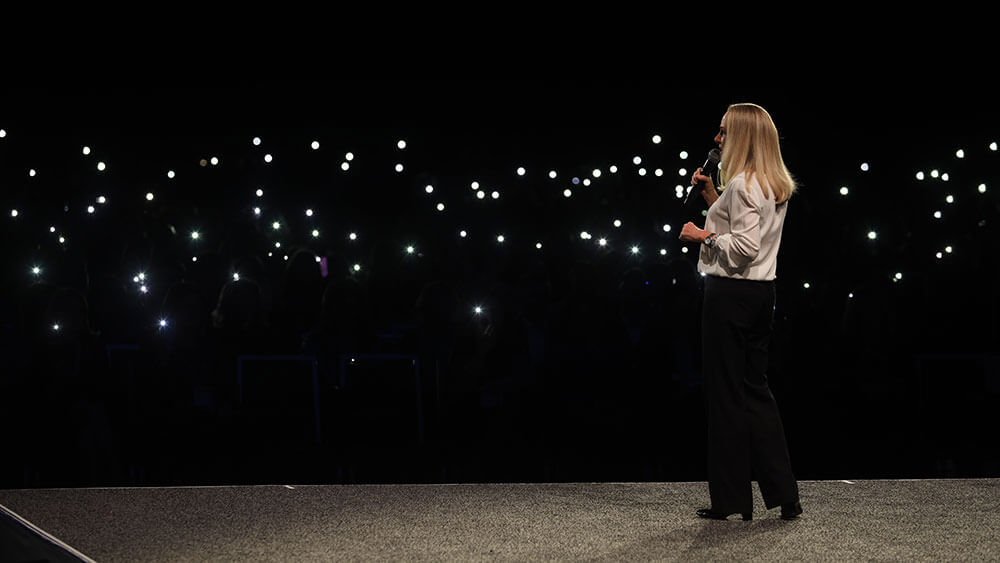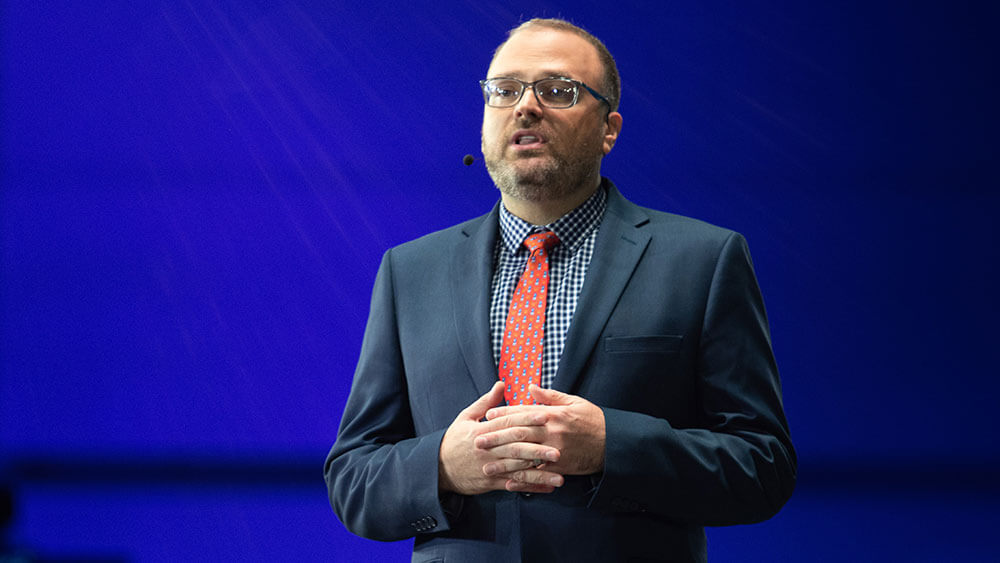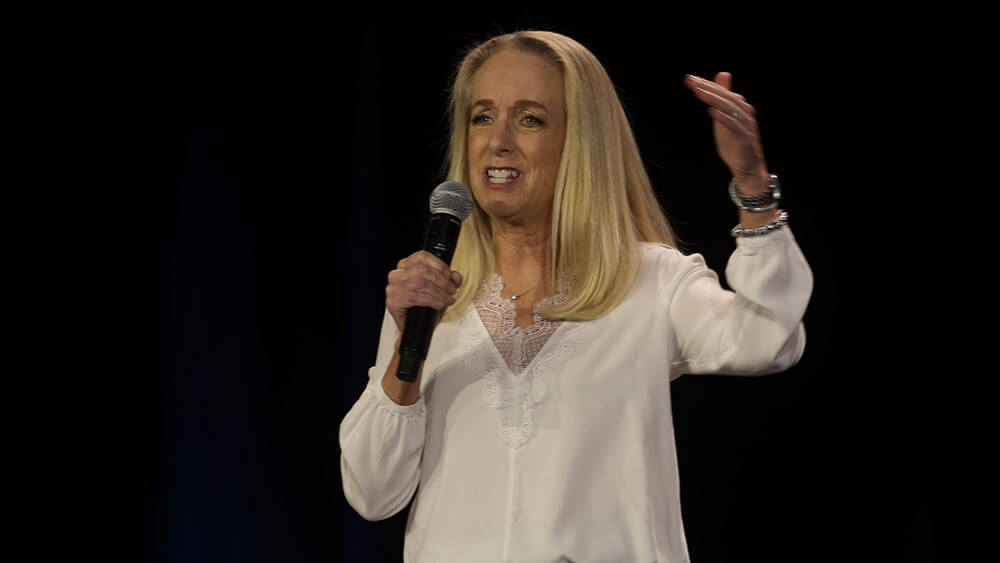
PCMA Board of Trustees Chair Valerie Sumner asks attendees at Convening Leaders 2020 to “show their light” to amplify that by empowering individuals, events professionals can work together to advance society. Since January, the COVID-19 crisis has made that message even more relatable. (Jacob Slaton Photography)
When Convene spoke via a Zoom call to PCMA Board of Directors Chair Stuart Ruff-Lyon, CMP, DES, and PCMA Board of Trustees Chair Valerie Sumner, DES, early on Monday, March 16, it was just as RIMS (Risk and Insurance Management Society, Inc.) — where Ruff-Lyon serves as the vice president of events and exhibitions — announced that its annual conference and exhibition had been canceled. It was a first for the association. Never in RIMS’ 70-year history had its annual event — due to be held May 3–6 in Denver and expected to draw 10,000 participants from more than 70 countries — been scratched.
Ruff-Lyon said that he, along with other members of RIMS leadership, had been working 17-hour days for two weeks straight, trying to make their way through the complex decision-making process and analyzing its ramifications, as the COVID-19 crisis escalated. “We had to look at every possible scenario,” he said. “We engaged in a lot of different scenario planning and different risk assessments to lead us to an informed decision.” In the end, cancellation was inevitable when it was announced that Denver’s Colorado Convention Center would close through May 12.
That the event wouldn’t be held was especially unfortunate, Ruff-Lyon said. “Risk professionals count on our annual conference for education and as a place to come together and get resources. They’re on the front lines of crisis all the time.”
RIMS annual meeting program featured 200 sessions and more than 300 speakers, and while there are no plans to hold a virtual RIMS 2020, RIMS will be working to ramp up online educational offerings for later in the year.
When asked if the time is ripe for event professionals to upskill in terms of digital event production, Ruff-Lyon and Sumner, who is principal of VRS Meetings and Events, were in agreement. “I think a lot of event professionals have already been exploring this, but, now more than ever, we do need to pivot to digital,” Ruff-Lyon said. “We need to look at those options, especially for the foreseeable future. We’re a face-to-face industry and that’s how we’re going to always be powered to some degree. But right now, as events are canceling and postponing, event strategists should look to online solutions, virtual solutions, to provide that sense of community and valuable content.”

“As events are canceling and postponing, event strategists should look to online solutions, virtual solutions, to provide that sense of community and valuable content.” — PCMA Board of Directors Chair Stuart Ruff-Lyon (Every Angle Photography)
Cultivate Community Online
That sense of community is especially important, Sumner said. Among her clients in the education sector is an association of educators who are now home, teaching virtually. “We’re looking at how best to provide professional development to their members through digital events, podcasts, Twitter chats, Instagram, and other social media — all ways we can reach out and provide not only information but emotional support, stability, and content,” she said. Sumner said that they are planning multiple scenarios for the spring, summer, and fall, and each one includes a digital platform.
The ability to pivot to digital is key. “Thank goodness I took the DES course last year,” Sumner said. “It’s been a tremendous help, and one of my client colleagues is currently taking the course. I’m so glad I took that course — it’s so helpful in having the DES tool kit as a reference.”
“I think that’s a great point,” Ruff-Lyon agreed, “about engaging the full community. It’s not just the virtual events that are available, but social media, different platforms are available for people as well to keep the community going.”
That includes not only the stakeholders event professionals engage within their organizations and professional sectors, but engaging in conversations among business strategists themselves. Sumner said it has been vital for her to set up chats with her colleagues, and she advises others to create “groups that you feel comfortable with, that you can connect with throughout this time, on a regular basis,” she said. “It’s so important for collaboration and communication to continue.We need to be focused on creating effective communication channels over time.”
Become More Well-Versed
Ruff-Lyon said that this experience has brought to light how event organizers need to learn more about their organizations’ event cancellation insurance coverage, to know the nuances of different force majeure language, and “understand the opportunities that are available, both from a virtual perspective or postponement, and making the best possible decision for their members.”
For her part, Sumner had been working through postponing a conference that was to take place in Austin, Texas, in April to August. “In somewhat of a miracle, as this conference is a self-contained event,” she said, “our hotel partners, exhibitors, general service contractor and vendor partners were able to work the magic to reschedule the conference.”
She credits her long-time involvement with the PCMA community with developing relationships that enabled her to connect the group’s CEO directly with Austin Mayor Steve Adler to consult on the event.
The insurance questions around cancellation, they both agreed, has been very tricky. If a city hasn’t banned events, Sumner said, force majeure “doesn’t kick in — so big learning curve there.”

“It’s so important to be effective as we communicate with boards, trusted advisors, and internal colleagues so that everyone involved has the information needed to make best decisions.” — Valerie Sumner (Jacob Slaton Photography)
The Need to Diversify
Moreover, they concurred, the pandemic has brought to light the flipside of a fact that the events industry has long touted — an annual conference or convention is the financial lifeblood of many associations. That may validate the value of the event itself and the professionals responsible for its planning and execution, but when an annual event is canceled, as many have been, it can put the financial health of that organization itself in jeopardy. “This greatly impacts the bottom line of many associations,” Sumner said. “It’s bigger, much bigger for the association field.”
“It impacts the association or community on a broader level other than the event itself,” Ruff-Lyon agreed. “Canceling an event can put some associations in a very precarious position as it has a direct impact on an organization’s cash flow.” Ruff-Lyon believes that associations need to be strategic in creating new and diversified revenue streams. “In order to be sustainable after event cancellation, and to prepare for the next Black Swan event that could decimate our businesses, it’s important that all business models undergo thorough risk assessment and scenario planning.”
Sumner said this period of uncertainty, while extremely stressful, has shown to her the valuable role event professionals play. Conducting due diligence, connecting with expert advisors — insurance and legal experts, destination marketing organizations, hotels, and vendor partners — and working with internal team members to develop scenarios for decision making is critical.
“Looking at a conference scheduled for June,” Sumner said “we are considering timing, digital options, integrating digital and face-to-face, or a revised event format.”
Lasting Changes
Sumner wondered aloud what association events will look like moving forward: “How will citywide room blocks be handled? Will all associations be able to support cancellation exposure? How will hotel cancellation and force majeure clauses change?”
Ruff-Lyon reiterated that his biggest takeaway from this experience has been that event professionals need to “fully understand” contract language. “Whether it’s in our personal lives or our professional ones, this pandemic has highlighted the importance of understanding contract language,” he said. “As we move through this and into the future, I’m sure we will be working even closer with vendors, the hotel community, and others to amend cancellation clauses in our contracts. On top of that, event cancellation and what it means and how it’s triggered will be a new focus for many event professionals.” Other skills to develop, he added, include “risk assessments and risk management right now. It’s really the heart of what we’re doing here, it’s the scenario planning and things like that as to how this is going to play out.”
“Right,” agreed Sumner, “and communications. I believe communication is a strength for event professionals. It’s so important to be effective as we communicate with boards, trusted advisors, and internal colleagues so that everyone involved has the information needed to make best decisions. Our teams and stakeholder count on us for our experienced expertise and knowledge.”
“Communication is vitally important,” Ruff-Lyon agreed. “In addition to keeping all parties working on the event informed, keeping registrants and potential registrants, members and nonmembers updated can go a long way in maintaining your organization’s brand.”
This crisis also has “exposed the power and the importance of relationships, because you need to have the right partners in place and have those good relationships with people as you negotiate,” he said.
Personally, for Sumner, the crisis has reminded her every day “how important personal wellness is for all of us. I’m a runner and run every day,” she said. “It’s so important for all of us to have a personal wellness outlet for stress release.” Looking beyond crisis management to recovery, “wellness will be key,” she said, “for everyone as we move forward.”
Adding wellness initiatives to events is going to “be a big thing, going forward,” Ruff-Lyon agreed. And that includes, he added, “how we are conducting our meetings in terms of the sanitization practices. That will change and how we’re doing F&B, perhaps, even.”
On a lighter F&B note, Sumner predicted that the bento box is going to have a resurgence. “It’s going to be big,” she said. “There will be a lot of bento boxes.”
Michelle Russell is editor in chief of Convene magazine.
What Events Professionals Need to Know About COVID-19
PCMA has created a COVID-19 resources page to help event professionals find reliable information about the outbreak and to share events industry-related resources to ensure they are prepared.
